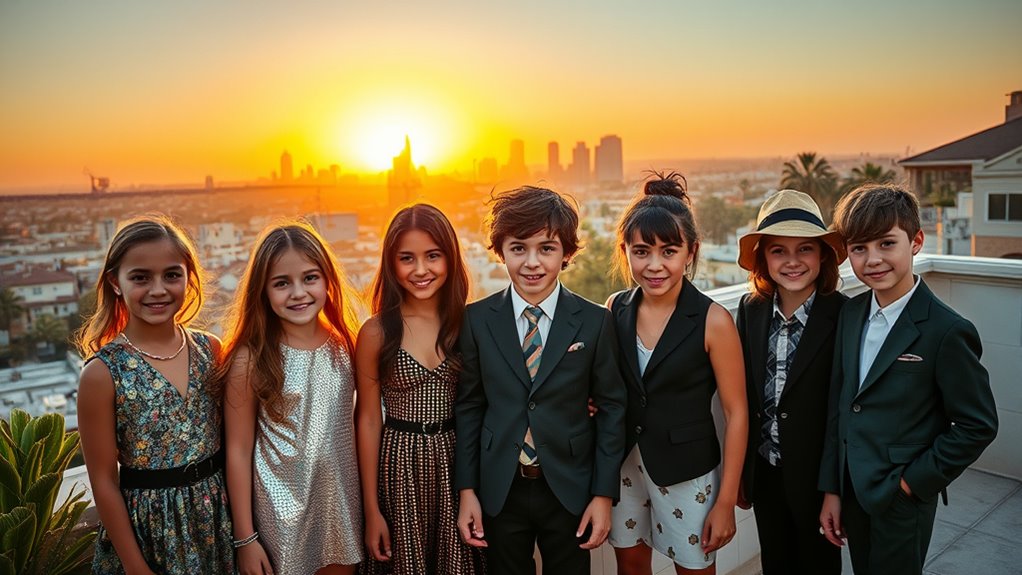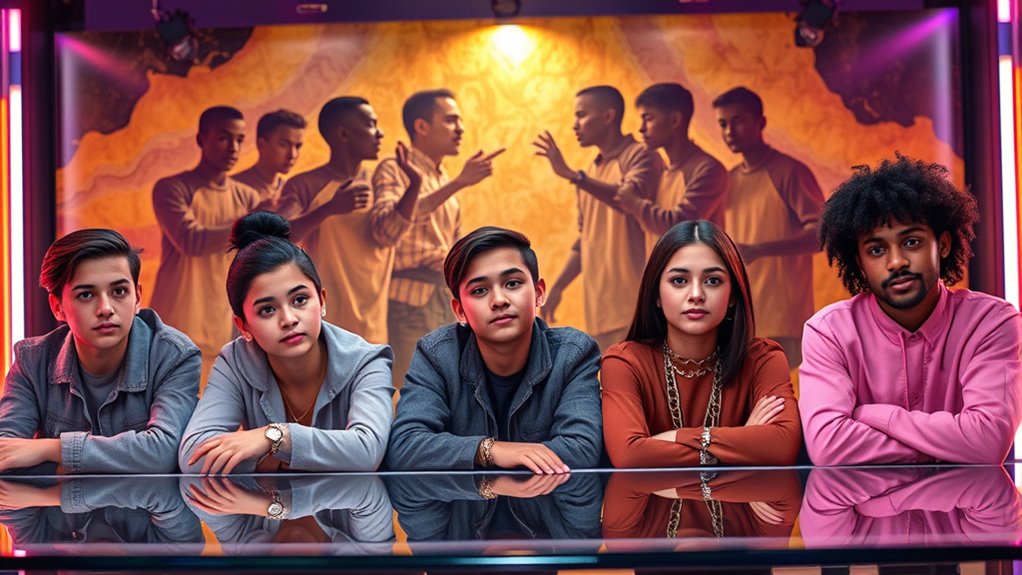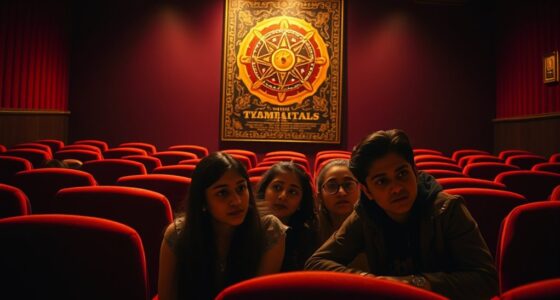In 2025, Hollywood’s newest stars include talented newcomers and established star kids shaping the industry amid ongoing nepotism debates. While some leverage family legacies to access opportunities, many showcase genuine talent, challenging stereotypes. Public opinion is mixed—some accept success based on skill, others scrutinize privilege. As industry hierarchies influence careers, understanding these dynamics reveals how fame, talent, and networks blend. If you stay curious, you’ll uncover more about this evolving scene.
Key Takeaways
- Celebrity offspring like Mia Threapleton and Jacob Tremblay are gaining recognition through diverse roles, challenging nepotism perceptions.
- Public acceptance of star kids depends on demonstrated talent, with industry networks influencing their career opportunities.
- The “nepo baby” debate highlights ongoing concerns about social privilege, merit, and transparency in Hollywood success.
- Many star kids leverage platforms to promote diversity and challenge industry stereotypes, shaping cultural narratives.
- Industry hierarchies and networks play a crucial role in success, making transparency vital to addressing nepotism concerns.
Rising Young Talents Shaping the Industry in 2025

Have you noticed how a new wave of young talents is transforming Hollywood in 2025? These rising stars are making waves across screens, from indie projects to blockbuster franchises. Mia Threapleton, featured in Wes Anderson’s latest, shows her promise early on, while Taylor Zakhar Perez’s growing presence keeps audiences hooked. Sarah Pidgeon and Young Mazino bring diversity and fresh perspectives, enriching the industry’s storytelling. Geraldine Viswanathan and Louisa Jacobson shine in roles spanning “The Last of Us” and “The Gilded Age,” demonstrating versatility. Meanwhile, Luna Blaise’s emerging talent signals a promising future. These actors are not just gaining recognition—they’re reshaping Hollywood’s landscape, proving that new faces can define the industry’s future with talent, charisma, and ambition.
The Ongoing Discourse on Family Legacies and Industry Opportunities

The conversation around family legacies and opportunities in Hollywood remains as relevant in 2025 as ever, shaping both industry dynamics and public perceptions. You see, nepotism continues to influence who gets ahead and who faces barriers. Here are some key points:
- Media framing links nepotism to social privilege and the broader issue of inequality, often framing it as a natural or longstanding practice rather than a form of privilege. This framing can obscure the structural inequalities that perpetuate social disparities. Additionally, the perception of meritocracy is often challenged when opportunities are perceived as inherited rather than earned. The ongoing debate also highlights how social mobility is affected by entrenched familial advantages. Moreover, the inheritance of opportunities can entrench existing hierarchies, making it difficult for outsiders to break through. Recognizing how elite networks operate can shed light on the mechanisms that sustain these disparities. Furthermore, the role of industry gatekeepers significantly influences who secures opportunities and visibility within the industry.
- Public reception varies, with some star kids accepted for talent, while others face scrutiny for perceived lack of merit. The degree of recognition can depend heavily on public opinion and industry biases.
- Industry access remains skewed, favoring those with established connections, making it tough for outsiders. This networking advantage often perpetuates existing hierarchies within the industry.
- Wealth and power consolidation in entertainment reflect larger societal trends of limited social mobility and inherited privilege. These trends contribute to ongoing debates about fairness and equal opportunity, influencing how you perceive fairness and opportunity in Hollywood’s evolving landscape.
Noteworthy Newcomers and Breakout Performances This Year

Amid ongoing conversations about industry access and family legacies, 2025 has also highlighted a new wave of talent making their mark. Christian Convery shines in *The Monkey* alongside Theo James and is set to star in *Flowervale Street* with Anne Hathaway and Ewan McGregor. His voice role in *Paw Patrol: The Mighty Movie* showcases his versatility and energy, boosting franchise success. Jacob Tremblay maintains his reputation for diverse roles, earning praise across indie and blockbuster films. Noah Schnapp transitions from *Stranger Things* into adult roles, attracting industry anticipation. Iain Armitage continues impressing with his stage and screen presence, gaining recognition for his range. Jack Stanton emerges as a versatile newcomer, already garnering critical praise for his performances, signaling a promising future. This year’s new talents are also benefiting from increased visibility thanks to social media platforms and strategic industry support, which are key factors in shaping their rising careers. Additionally, the support from the entertainment industry plays a crucial role in elevating emerging artists’ profiles. Moreover, understanding benefits of wood-burning can influence decisions about sustainable and efficient energy use in homes, paralleling the importance of nurturing new talent for sustainable growth. Exploring emerging talent development strategies offers insights into creating sustained success for these rising stars. Recognizing biodiversity in their environments can also inspire a more holistic approach to nurturing young talent, emphasizing diversity and resilience.
The Influence of Celebrity Offspring on Hollywood Diversity

Celebrity offspring often hold unique influence in Hollywood, leveraging their platforms to promote diversity and challenge traditional norms. They can spotlight underrepresented groups by choosing roles that break stereotypes and increase visibility. Their involvement can also drive industry change through advocacy and strategic choices. Here are four ways they impact Hollywood diversity:
- Promoting Underrepresented Roles: They choose projects that highlight diverse stories, helping reshape on-screen representation. Their participation in such projects often brings increased attention and credibility.
- Leveraging Platforms: Using their fame, they advocate for inclusive casting and hiring practices.
- Breaking Stereotypes: By taking on varied roles, they challenge traditional casting norms and inspire new narratives.
- Influencing Industry Initiatives: Their visibility can boost diversity initiatives and encourage industry-wide change.
Their influence extends beyond their careers, shaping Hollywood’s cultural and social landscape.
Trends and Tensions: Public Perception of Privilege and Merit

Public perception of privilege and merit in Hollywood is increasingly complex, shaped by evolving attitudes and media narratives. The rise of the “nepo baby” term in 2022 sparked widespread discussion about nepotism’s role in success, with media framing it as a reflection of social inequality. Despite this, only about 19% of the public sees nepotism as objectionable, suggesting many accept or overlook inherited advantages. Recognized talent among celebrity offspring like Alia Bhatt or Elizabeth Olsen tends to soften criticism, while those with less notable achievements face harsher scrutiny. This divide fuels debates about fairness, opportunity, and industry standards. Media often highlight nepotism as systemic, fostering skepticism about meritocracy, and influencing public opinion on who truly deserves success in Hollywood. Moreover, recent industry reports indicate that nepotism influences hiring practices, further entrenching perceptions of favoritism within the industry. Additionally, the perception of nepotism is often shaped by familiarity with industry networks, which can either reinforce or challenge existing narratives about success and merit. This dynamic underscores the importance of understanding industry hierarchies, and their impact on career opportunities, as well as the role of effective strategies for weight loss in maintaining overall well-being.
A transparent understanding of industry practices can help demystify how success is achieved and challenge the stereotypes surrounding nepotism.
Frequently Asked Questions
How Do Star Kids Balance Talent and Privilege in Their Careers?
You wonder how star kids balance talent and privilege in their careers. You see that while some rely on family influence, others work hard to prove their skills. You recognize that public expectations are high, making it challenging to stand out solely on talent. To succeed, you need to showcase genuine talent, stay grounded, and earn opportunities through perseverance, regardless of your background.
What Measures Are Industry Insiders Taking to Address Nepotism Concerns?
Industry insiders are actively planting seeds for change, aiming to break the cycle of nepotism. They’re promoting merit-based hiring, creating mentorship programs, and establishing clearer industry standards. Some are pushing for regulatory measures to formalize fair practices. Public pressure and media scrutiny act as a spotlight, guiding reforms like a lighthouse in a storm. These steps work together to open doors for diverse, talented newcomers, fostering a more equitable entertainment industry.
Are There Examples of Star Kids Overcoming Nepotism to Succeed Purely on Merit?
You’re asking if star kids can succeed on merit alone. Yes, examples like Babil Khan, Aditya Rawal, and Zahan Kapoor show they’re proving themselves through talent and unconventional choices. They focus on content-driven roles, audition genuinely, and stay low profile to break stereotypes. Their success highlights that, with hard work and skill, they can overcome nepotism and earn recognition based on merit, not just family connections.
How Does Social Media Influence Public Opinion on Star Kids’ Opportunities?
Ever wonder how social media shapes your view on star kids’ chances? It amplifies criticism and highlights perceived advantages, making you more skeptical about their merit. You see memes, debates, and hashtags that question fairness, often leading you to believe nepotism dominates the industry. This online environment fuels your perception that star kids get opportunities easily, pressuring filmmakers and casting agents to contemplate talent beyond family ties.
Will the Rise of Star Kids Lead to Lasting Industry Diversity Improvements?
You wonder if star kids will bring lasting industry diversity. While their rise can spotlight talent beyond connections, it often reinforces existing biases, making true change slow. You can influence this by supporting diverse stories and actors, demanding fair casting practices, and encouraging the industry to prioritize skill over lineage. Ultimately, your voice and choices can help push for a more inclusive industry that values talent equally.
Conclusion
As you watch these stars rise, remember they’re threads woven into the fabric of Hollywood’s tapestry—some born from golden looms, others forging their own path. The debate on nepotism mirrors the delicate balance between legacy and individuality, like a pendulum swinging between tradition and innovation. In this evolving landscape, their journeys symbolize the ongoing dance of privilege and merit, reminding you that every star’s shine is a story, shaped by both history and the hope of new beginnings.









